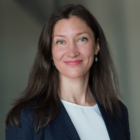Freedom – the Baltic way
“All injustice and oppression eventually come to an end. The spirit of freedom is stronger than any slavery. Sooner or later, any lies will be illuminated by the truth. Let’s hold each other’s hands closer and look into each other’s eyes. One can almost physically sense the togetherness above everything.”
These words were spoken by Dainis Īvans, one of the most visible leaders of the Latvian independence movement, in a radio address to the people forming the Baltic Way or Baltic Chain on 23 August 1989. This was a peaceful political demonstration of two million people joining their hands to form a human chain spanning almost 700 kilometres across the three Baltic states – Estonia, Latvia, and Lithuania. The people in these three countries were demanding public recognition of the fact that the Baltic states had been occupied by the Soviet Union, an event – the dividing of Eastern Europe – which had been cruelly agreed upon with Nazi Germany on 23 August 1939 (in a secret pact by Molotov and Ribbentrop, the respective foreign ministers of the Soviet Union and Nazi Germany). Furthermore, the demonstrators called for renewal of the independence of the Baltic states.
The Baltic Way was miraculously organised by a small group of independence leaders from all three Baltic countries in less than six weeks, at a time when no digital technology existed to enable communication and logistics. The idea was to ensure that people would hold their hands for 15 minutes from 19:00 until 19:15, united and uninterrupted in a human chain that would connect the three Baltic capitals – Tallinn, Riga and Vilnius. And they managed to pull off, without the occurrence of a single incident, no less.
I remember my own presence at the Baltic Way. I was 14 back then. My mother and I wanted to join this human chain in the centre of Riga. We were standing in the crowd, joyful, excited, and proud of all the people there. Right where we were standing, there were enough people to form the chain, so we just observed it from the side. Giving a hand to a stranger was not something that people would readily do, but somehow all the otherwise introverted Latvians looked at each other and didn’t shy away from holding a stranger’s hand, irrespective of who they were or where they came from. Compared to the enormity of the moment, the boldness, the daring, holding a stranger’s hand didn’t seem like such a big deal after all. I recall observing the pride and determination on people’s faces. We all felt happy; we were all part of a big dream – that of independence and freedom.
A few months later, the Berlin Wall fell, democratic revolutions were sweeping across central and eastern Europe, and a group of far-sighted European foundation executives gave breath to the EFC. Indeed, 1989 was a year of historical significance.
Now, 30 years later, the question of freedom is something I would like to reflect upon. I work at a foundation that promotes democracy and the ideals of an open society. Freedom itself is at the core of an open society, but today the concept of open society is being questioned and even attacked in some countries.
Although I view these events with concern and dismay, I also recognise the many challenges that come with the idea of freedom. During Soviet times, freedom was a dream, an aspiration. But as an independent nation, we now finally actually enjoy freedom. Membership in the EU gives us the right to travel and to work freely in other European countries, something that people in the Baltic states appreciate very much. We can freely choose our path in life – the way we raise our children, how we spend our time, our professional and personal development. Enjoying this diversity of options is an aspect of freedom that once seemed unimaginable and one that is easy to take for granted.
But freedom is also about making a choice – what are we choosing to spend our time on, how are we earning or spending our money, what is important for us, and what is not? How will the steps and actions we take impact our own lives, society, Latvia, Europe and the world?
Making choices and bearing responsibility for the consequences of these choices is never easy. Like Sir Isaiah Berlin said, choosing is hell. How easy it was for a child to sit in her mother’s lap, knowing that everything will be taken care of. How challenging it is for an adult to think and contemplate the options, the pros and cons, and to make a decision and bear the responsibility for it, without blaming any external force. This is a freedom that many people who lived before us didn’t have and one that still does not exist in many places on Earth. Freedom for me today is about growing up, part of being an adult. It is something that comes with responsibility and being truthful to oneself. Is 30 years enough time for an individual and a society to grow up? I hope so.
Photo courtesy of Aivars Liepiņš.
Authors

Executive Director, Foundation for an Open Society DOTS